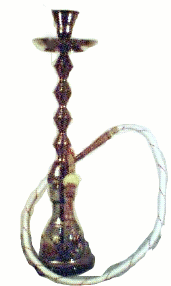

ARABS REVIVE TRADITION OF TALKING ABOUT WORLD AROUND NARGHILAH
By: Leila Elias*
The narghilah comeback is in full swing in the Arab east. In coffee houses and restaurants, at social soirees and in homes, the narghilah has become a fixed part of the daily menu. Today, both men and women sit and savor the multitude of eastern flavors of tobacco. Narghilah smoking is an old and now re-emerging Arab tradition, attracting the young and old, enveloping all who wish to relax and contemplate the bustling world and busy life around them.
For those unfamiliar with the term, more common names such as water pipe, hookah, hubble-bubble and even shisha may better conjure the image. Although the narghila itself is used for smoking, today among the Arab people, as it was for centuries before, it represents a social activity and intimate pastime for friends and family alike.
Tobacco, moist and crumbled and nowadays popularly mixed with fruit pulp, is placed atop the water pipe in a small holder. Small pieces of red-hot charcoal are placed upon the wet tobacco leaves. The user begins to puff on a wooden-tipped mouthpiece that is attached to a long, flexible hose, and the smoke is cooled by passing through the water in the narghilah's glass base. It normally stands waist-tall, ornately decorated with brass or silver. Next to its seated user, it appears to be a best friend, a partner and supporter.
For those who inhale the smoke of the narghilah, it becomes an institution of contentment, the "licence d'etre" of freedom to formulate philosophical opinions and conversation and to pensively contemplate, and occasionally resolve, the problems in the world. Puffing away in sagacious moments of silence, smokers begin a methodological procedure of thought or discussion with every inhaling and exhaling drive. Its strength is in its user who puffs away the worries or anxieties that fill the mind.
Once a male-oriented pastime, narghilah culture now is popular with the women of the Arab cities. From Damascus to Beirut, working mothers and career women, university students and teens. They sit together, the traditionally dressed and those in European fashions, all feminine in their way of smoking. They now mingle in that which once was reserved for their male counterparts. They, too, provide input and answers into the vast horizons of problems and affairs.
It is in a Beirut qahwa or coffee house, amid the sounds of bubbling water and the clouds of tobacco smoke, where Abu Qasim sits and carefully recounts memories that return vividly with each breath of smoke.
His are the memories of the old days when excitement rallied with the successful call for independence, when the young men gathered together in the qahwa, the narghilahs beside them, and spoke in unison for the good of their country.
Qasim sits with his wife as the narghilah is passed back and forth amid the quiet and methodical discussion of their plans and dreams. They talk of the "what if" -- the optimism and hope of their generation that peace one day may come to this region, all for the good of their people and their country.
Yet, as the puffing continues, they begin to discuss their distress and concern that the existing world does not recognize the injustice brought upon their people by another generation of occupation. The glowing embers of the narghilah continue their work as Qasim and his wife quietly continue their conversation in the blackness of yet another electricity blackout, a result of an Israeli bombing.
And then there is Qasim's son, too young to know the significance of his grandfather and father's narghilah. He pretends that he, too, inhales and exhales what each generation before him did. He watches as everyone around him "sips" the hose of the narghilah, as they would the customary cup of coffee.
He listens as every aspect of society is discussed: Family and friends, relationships and breakups, business ventures and economic woes and even the politics of the country. And Qasim's son learns that he too one day will sit and savour the essence of the water pipe and all that relates to it -- thought, contemplation and meditation, all for the good of his family, all for the good of his country.
The evening air atop Mount Qasioun in Damascus is fresh and invigorating. The extraordinary beauty of the city at night is breathtaking. It is here one finds families and friends enjoying the view and relaxing after a hard day's work. It is here, as well, that one hears the sounds of coffee being sipped amid a backgammon game. The only other sound is the puffing reverberations from the water pipe.
Along the Raoche of Beirut, where the Mediterranean ebbs and flows, ridding the air of the day's humidity, a similar scene comes into view. Men and women, after a long day at work, come by the coffee houses and restaurants to relish the comfort of the pipe. Conversation is quiet yet profound, while the sensation of the narghilah encompasses all.
The narghilah is the ticket to the passage of comfort. In the midst of these ever-expanding Arab cities, it becomes a temporary release from troubles and worries, or a stage for discussion and thought. Buildings rise, modern technology hums and machinery pumps away in building after building. Data circuits, replete with computer signals, light up every which way.
And yet, the narghilah remains, as it was hundreds of years ago, the stoic and simple reminder of the possibilities of comfort, enjoyment and serenity. Hopefully, all parties will participate in the next round of peace talks, and beside them, there will be a few narghilahs.
*Leila Elias holds a master's degree in Middle East and Islamic studies from the University of Toronto. She resides in South Whitehall Township and wrote this column upon her return from a visit to Syria and Lebanon. This article is copyright of the Allentown Morning Call.
![]()
